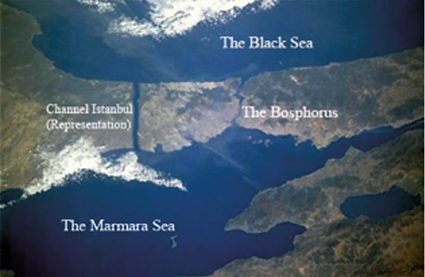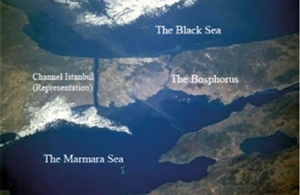Why Turkey is to Dig a Parallel Bosphorus Canal
The Turkish Republic is ready to start implementing a grandiose infrastructure project - the construction of the Istanbul Canal (Kanal Istanbul), which is to complement the Bosporus Strait, Turkish President Recep Tayyip Erdogan announced at a congress of the ruling Justice and Development Party.
Kanal Istanbul is a Turkish project for an artificial sea-level waterway, which is to be built on the European side of Turkey, connecting the Black Sea to the Sea of Marmara, and thus to the Aegean and Mediterranean seas.
President Erdogan said that construction of the canal will begin in the near future, making an alternative to the Bosphorus and increasing transport flow between the Black Sea and the Sea of Marmara. Experts believe that the implementation of Kanal Istanbul will not only have economic consequences, as they highlight the fact that international acts impose restrictions on the passage of warships through the Bosporus, but these norms may not apply to the new canal.
The Turkish President first mentioned the canal in 2011, when he was Prime Minister. In 2013, the Ministry of Transport of the Republic reported on the theoretical readiness the project, however, the start of construction work was postponed.
At the end of last year, the government submitted the final draft of the future structure. The canal will be dug in the west of Istanbul, after which the city will be divided into three districts, with the historic center and business districts becoming an island.
The construction of Kanal Istanbul is set for completion by 2023, when the country will celebrate the centenary of the Turkish Republic. The length of the planned waterway is 43 km, the width around 400 m, and the depth about 25 m. The canal could potentially serve 150-160 cargo ships per day. The Turkish government has said the key goal of the construction is to reduce the burden on the Bosphorus Strait, which is struggling to cope with the flow of cargo through it.
The new canal will be inscribed in the city infrastructure, featuring modern residential complexes on its coast, to which a metro will be built. According to Turkish media, real estate located in the area of future construction has already grown significantly in price. The project also envisages a new port.
There are opponents of the canal construction in the country. In particular, environmentalists warn that a water artery could destroy the ecological balance in the region and lead to an increase in the level of hydrogen sulfide in the Marmara Sea. For the residents of Istanbul, the canal threatens to emit a constant unpleasant smell, and for the ecosystem - the death of certain species of marine fauna. The canal can influence even the rivers flowing into the Black Sea (the Danube, the Dnieper and the Dniester), as the sea will begin to lose its water faster, scientists warn. Another possible problem is the reduction of sources of fresh water. In particular, the Sazlidere Reservoir, which supplies water to 13 districts of Turkey, lies along the path of the future canal.
The construction of the canal is not Erdogan's only grandiose project. A total of 30 major infrastructure projects are planned within the framework of the government "Strategy-2023".
In 2017, the construction of the suspended Dardanelles Bridge started, the length of which will be 3.7 km. By 2022, the bridge will connect the cities of Lapeski and Gelibolu and become the longest suspension bridge in the world.
Railway and automobile tunnels under the Bosporus have already been commissioned. The cost of building an underground railway branch was about $4.8 billion, while for the construction of an automobile tunnel, $1.2 bln in private investment was attracted.
In addition, the construction of a third international airport is nearing completion, to be put into operation in autumn of this year.
At present, communication with the Black Sea via the Bosporus and Dardanelles straits is regulated by the Turkish side. However, according to the Montreux Convention of 1936, Turkey cannot charge fees for passage through either. But these rules will not apply to the "Istanbul" - passage through which will be charged.
Experts are sure that the construction of the Istanbul canal is a sign that Turkey wants to strengthen its positions in the international arena. For Ankara, this project is important not only from the point of view of economic profitability, but from the point of view of geostrategic interests and the transition from the category of regional to the status of world power.
By Dimitri Dolaberidze











